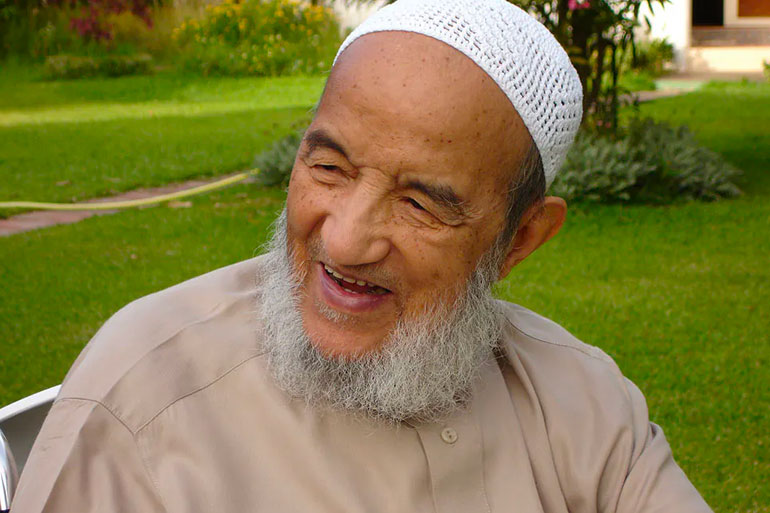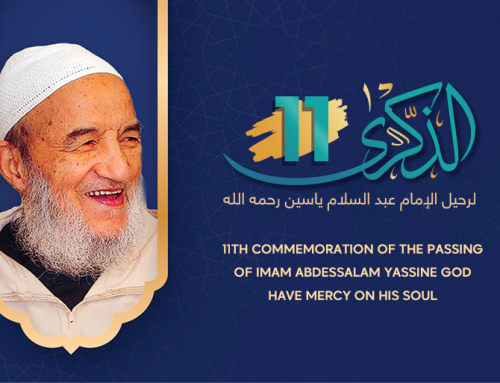Hassan Elannani
January 23, 2024
(This is a section from a paper published during the Third International Conference about Imam Abdessalam Yassine School of Thought, on Dec 19-20, 2020)
As a leading figure and visionary in the Muslim revivalist movement, Imam Abdessalam Yassine was a prolific author and scholar with deep insight into modern issues. His intellectual legacy is rife with humanity-centered perspectives that find their roots in the teachings of Islam and the common human values found in the Universal Declaration of Human Rights and the Declaration Toward a Global Ethic. He is considered by his students and followers as a Mujaddid (leader of comprehensive Islamic renewal) and an Imam (well-versed scholar of Islamic sciences) who has revived the understanding of Islam on the basis of the Quran and Prophetic traditions, and has built a worldwide movement on the foundations of his school of justice and spirituality. The essence of the thought system formulated by Imam Yassine is the Prophetic Method, which represents his intellectual blueprint for an Islamic revival at the individual and collective levels. He developed the Prophetic Method with the main goal to prepare people for a spiritual and communal life that encompasses their worldly affairs but extends beyond their earthly lives.
Imam Yassine spent the last four decades of his life formulating and disseminating his Prophetic model, and charting a course of individual salvation that guides people to their primordial state as free-willed servants of God but also ephemeral guardians of their earthly abode. The Prophetic model seeks to give an authentic meaning to humanity’s experience with all its successes and failures by considering people as human beings who are capable of ascending to their highest spiritual aspirations or succumbing to their lowest animalistic desires. His Prophetic model is based on a developmental principle that explains human spirituality in a series of stages, starting with natural existential questions about the divine, purpose of life, and destiny; and ending with complete submission to God and unwavering faith in the Creator. In his critical book The Muslim Mind on Trial: Divine Revelation versus Secular Rationalism, Imam Yassine discussed the philosophical foundations of atheistic and secularist interpretations of the human condition but recognized that for the perplexed minds to hear the divine message clearly, there should be mutual efforts to address the myriad social and economic problems, chief among them are abject poverty, raging wars, and savage capitalism that uses every media platform to recruit consumers for its novel fads and gadgets.
Imam Yassine represents a call of conscience that silences the chatter of the world and brings it back to itself. A world that stands at a historic crossroads and critical juncture to solve humanity’s most urgent issues related to peace, social justice, economic equality, and human rights. However, the capital-growth perspective that controls international commerce and financial markets has no room for humanistic endeavors that could make meaningful changes in the present or future of world citizens. Adopting a humanistic developmental perspective that gives priority to human beings is of utmost importance, especially considering the current and pressing challenges facing humanity: wars, poverty, health pandemics, global warming, and savage capitalism. In his seminal book Justice: Islamists and Power, Imam Yassine presented a harsh and vivid criticism of an insatiable materialistic civilization that thrives on consumerism and overuse of natural resources but ignores the plight of billions of its poor consumers. He lamented the downward spiral of the human condition resulting from the vagaries of financial markets, economic speculation, natural disasters induced by environmental mismanagement, and the martial and political turmoil in many under-developed countries. Notwithstanding all these formidable obstacles, he suggested that we embrace a new approach to the current crisis to save the earth and its inhabitants. This approach is built on justice and spirituality: justice in its economic, social, and environmental aspects, and spirituality at the individual and communal levels.
Imam Yassine dedicated his major works to address the principles of justice and spirituality in both personal and communal perspectives and offered plans of action to achieve them. Instead of copying blindly the views of Muslim classical scholars on pertinent issues, he developed his Prophetic Method on the precepts of the Quran and Sunnah, with critical examination of scholarly opinions, to discern the way forward to achieve social and economic justice among all people and spiritual felicity inside each individual’s heart. He described the Prophetic Method as “an uphill road that elevates the servant of God to prostrate in humility, obedience, and sacrifice; and that elevates the nation from its slumber, servitude, and socioeconomic backwardness” (Yassine, Al-Minhaj An-Nabawi, 1989, p. 86). This seemingly innovative dual method, albeit embedded in the Quran and Sunnah, recognizes the centrality of the individual in the Divine’s grand design and the instrumentality of the community as a conduit to achieve individual freedom and prosperity in both spiritual and worldly terms. The individual and the community are inseparable, and it is likewise for justice and spirituality. Apparently, the Imam sought to juxtapose the individual/community and spiritual/justice components of his model to demonstrate that any effort to elevate humanity must take into consideration this multi-dimensional perspective, with the individual conspicuously staged at the center of this humanity-centered paradigm, which has three key characteristics: Authenticity, purposing, and repurposing.




